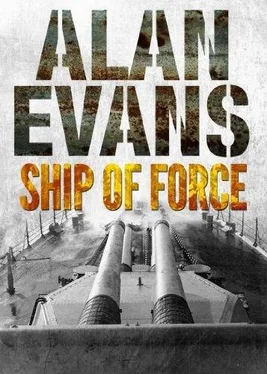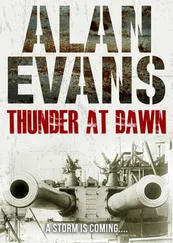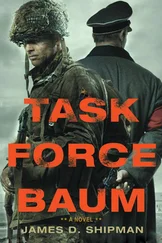Sanders crouched right up against the bulkhead and Smith knelt beside him so their faces were close to each other and that of the Kapitänleutnant. Sanders’s face was as pallid as the German’s. He was not yet familiar with the sight of death. He whispered, “Brodie says his chest’s stove in and he’s all cut up about the body and legs. It must have happened when we shelled them, sir.”
Smith nodded. The Kapitänleutnant had survived that and they had saved him from the sea. But only briefly. Brodie said the man had not got long and Smith agreed. He was a long way from being a doctor but he had seen men die before. Too many.
Sanders went on, but hesitantly, “I — think there is something you should hear, sir. He keeps repeating some odd phrases. Every now and again he starts shouting or talking and goes on till he collapses. Then after a bit he starts again, though he’s getting weaker all the time. If you could wait, sir…?”
Smith nodded.
They waited.
Sanders said, “I talked to the other one. It seems she was a Flanders boat out of Ostende. I asked where she was bound but he just clammed up at that.”
Smith asked, “Where did you learn German?”
“My father is a doctor. He had an old friend in practice in Berlin. I spent quite a few holidays there when I was a boy, and one or two leaves from the Navy, I don’t speak German all that well but I can understand —” He broke off and lifted a warning hand.
The Kapitänleutnant’s shallow breathing had quickened, the lips moved and the lids over the eyes twitched, lifted. He stared blankly. The flutter of breath between his lips was a whisper that grew into a mumble. The voice had some strength now, but still Smith could barely hear it though his head was bent close. He could feel the man’s fluttering breath on his cheek but he could only pick out odd words from his slurred whispering: “Vater…Ilse…”
The mumbling went on, growing stronger. Sanders whispered, interpreting, “Talking about his father, his home…his girl, or his wife, I think…the boat. Now, maybe…”
The words were clearer now but still they meant nothing to Smith until Sanders whispered, “ Schwertträger — hear that, sir?” And seconds of incomprehensible muttering later, “There, sir. Hear it?”
This time Smith did, his ear picking it out. “ Schwertträger .”
Sanders said, “It means sword-bearer. It might be a ship, or a code-word, sir?”
The lights blinked, went out and the wardroom was plunged into pitch blackness. The Kapitänleutnant’s voice went on, lifting and falling with Sanders’s whispered interpretation like an echo: “ Hinterrücks anfallen — that’s stab in the back, sir — couldn’t get any of that — Springtau — that’s a skipping rope — he must be thinking of his children…” The voice in the darkness, disembodied, stopped.
A torch clicked on, held in the hand of the sentry, its beam directed at the German seaman who squinted at its glare. Enough of it spilled over to cast a glow on the face of the Kapitänleutnant just as his voice ceased. He was looking blankly into Smith’s face then his eyes moved to Sanders and past him. The lights blinked, came on again. Somebody cheered, ironically. Smith was watching the Kapitänleutnant, saw his eyes going about the wardroom, then coming back to stare at Smith and Sanders. His face twisted with pain, he coughed, and he coughed up blood. Smith took his handkerchief and wiped the blood from the man’s mouth.
The Kapitänleutnant’s chest was heaving now, his back rigid with effort, head back. His whisper was almost a breathless shouting. Sweat shone on his face. “ Sie haben nicht gewonnen! ” He coughed, slumped but struggled to lift his head again, “ Bald kommt der entscheidender Schlag und wir werden diesen Krieg zu Ende führen! ” He slumped again, lapsing at once into unconsciousness.
Smith wiped the German’s face as Sanders translated, “I think he said something like, ‘You have not won. Soon the — the decisive blow will fall and we will — will end this war’.”
Smith stood up slowly. The man had been aware, then. Just. A kind of drunken awareness. He knew where he was and who he was talking to, but he was not thinking clearly enough to guard his tongue. He should have kept his mouth shut but he was dying, slipping over the edge and the man knew that much and was shouting defiance. Guts made him speak. Valour was the better part of discretion. That had not been a threat so much as a promise. ‘Soon the blow will fall…sword-bearer…stab in the back.’ The words were a warning. But of what?
He asked, “Have you a notebook?”
“Yes, sir.” answered Sanders.
“Stay with him. Note every word he says.” They needed to know more.
Smith turned to leave and caught sight of the miserable face of the German seaman, his eyes fast on his dying officer. Smith patted the man’s shoulder as he passed, a brief gesture of sympathy, and said to Brodie, “Can you get him a dram?”
“He’s had one but I’ll give him another. Aye, sir.”
Smith left the stink of the wardroom and climbed to Sparrow ’s deck and thence to her bridge. Dunbar turned his head with its turban of bandage but Smith looked blankly through him. ‘Schwertträger … Hinterrücks anfallen.’ A threat, no doubt about that. But of what? A threat uttered by a U boat commander whose boat was headed for the Channel or the Atlantic beyond. So — a new submarine weapon, or a new submarine tactic that would send the figures of shipping losses soaring even higher?
That would do it. That would end the war.
Braddock had said so and he was neither pessimist nor scaremonger but a man who dealt in hard facts.
Smith brooded over it, standing at the back of the bridge with Buckley a yard behind him and looming like his shadow.
And then he thought about Morris and his report. Four aircraft destroyed on abortive reconnaissance missions to Ostende and the coast north of it. They had been getting a bit of a pasting lately! But that mystery had nothing to do with U-boats. De Haan was hardly more than a village. There was no harbour, not even a stream. The coast from Ostende to De Haan was shallow, shelving beach running up into dunes. A fishing boat could well be hauled up on, or launched from that beach, but that was all. There was nowhere on that coast between Ostende and Zeebrugge that could be used as a base by submarines or destroyers. The anti-aircraft batteries in the wood were new. Why? And why the continued patrol of Albatross V-strutters that reacted so quickly, that pursued the RE8 and sent it down in flames into the sea?
He thought of Morris, Bill and the young men like Bill in the other three aircraft who had not returned…
He swore and saw Dunbar glance at him quickly. There was another lonely man now, with thoughts, memories to bedevil him. Smith took a pace forward to stand by the Lieutenant and said, “I’m a new boy around here, newer even than Sanders. There are things I need to learn, need to know.”
So he talked with Dunbar and set him talking as Sparrow picked her way through the shoals and the dying night. Among other things Dunbar told him about Victoria Baines, praising her until Smith was almost won over.
They talked until Dunbar said, “Should be getting light soon. We’ll be up with the monitors and should be able to get that German to a doctor aboard one of them.”
Smith only grunted and fell silent. He doubted that any doctor would help the Kapitänleutnant. And with the first grey light Sanders came to the bridge. He looked older now, the night in the wardroom had done that. He reported to Smith: “He’s dead, sir.” He held out a notebook.
Читать дальше












